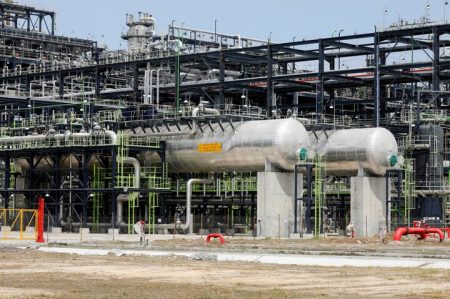By Jean-Baptiste Piggin and Kristina Dunz, dpa
Chancellor Angela Merkel meets Kenyan leaders on Tuesday at the start of a three-day swing through Africa where business opportunities, especially purchases of gas and oil, are high on the agenda.
In her weekly video message to the public, Merkel explained, “In Kenya, I’ll be finding out how renewable energy is coming into wider use… In Angola, we want to establish an energy and raw materials partnership.”
Germany has already had such an energy partnership since a 2007 G8 summit with Nigeria, the third and last nation on her schedule, but the accord has not performed well, Merkel admitted.
“My visit is intended to give it a jolt so the partnership can develop better,” she said.
A party of business leaders are travelling with her and are expected to sign deals that have been negotiated in recent months.
Merkel was due to fly out of Berlin Monday afternoon, arriving in Kenya late at night. Her return is scheduled for the small hours of Friday. It is Merkel’s third visit to Africa as chancellor: the first was in 2007.
Germany unveiled a new policy on Africa last month, shifting the stress away from selfless development aid and putting more emphasis on the German interest in obtaining minerals and oil.
Berlin has been dismayed by the rush of China, Brazil and other rising powers to sew up resources deals in Africa.
Aides said the corruption that is endemic in the three nations Merkel will be visiting makes it difficult to grow investment at a time when German companies face strict scrutiny to ensure they never pay bribes.
Germany was a colonial power in Africa until the First World War ended in 1918, when it lost control of the territories that are today known as Namibia, Tanzania, Rwanda, Burundi, Cameroon and Togo.
Its interest in Africa revived in the post-colonial period, with many Germans eager to use their wealth to end world poverty, but disillusionment soon set in amid reports of waste and corruption.
Under the new policy Berlin will be adopting a tougher approach to Africa, requiring future development aid spending to achieve “value for money.” It will demand better access to African markets for German companies.
The paper said Germany will stress its own values in Africa, including good governance and democracy.
Merkel criticized the three nations she is visiting this week, saying, “All three countries still have considerable problems establishing a truly stable structure of government.”
Berlin officials say 600 German companies operate in Africa and employ 146,000 people there.
The centre-right government’s new stance towards Africa has been criticized by aid groups.
They charge that the emphasis on investment and mineral rights means Germany will try to cut deals with tycoons and governments, and possibly leave out of account the majority of ordinary Africans who live in rural areas.
They also argue that Germany should be less aggressive towards the import controls that often protect African industries.
The chancellor’s visit to Kenya will also include a visit to the offices of the UN Environment Programme (UNEP) in Nairobi.
In the Angolan capital Luanda she will meet non-government figures, described as “representatives of civil society,” to show her support for freedom of speech and of the press.



